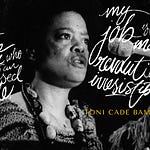introductions: this is the third time i’ve read blood in my eye by george jackson and the first time i feel like it’s sticking.
Hello and welcome to Threadings., the newsletter and podcast where I discuss what stitches me up at my seams in this world which routinely tries to kill me. Today, this includes: truth-tellers unpopular during their lives yet lauded after death, over 78% dark chocolate, sitting in silence with my elders— all manner of sweet things that at first glance might feel bitter.
The last real essay I wrote for us talked about the spectacle of liberation we in the Western world seem addicted to. There was no happy ending attached to those thoughts because I wanted it to read as haunting and unsettling. I wanted to leave us with the ask, well, then, what? What do I do if I can’t pretend? Where do we go from here? The processes of radicalization feel bitter at first as we realize what life tastes like without artificial sweetener. Good. I recorded a video today explaining more on why I rescinded my support (and my silly shoulder shimmies) of the International Longshoreman Association (ILA) Strike to secure the use of their labor over artificial intelligence. I then seek to give introductory answers to the what do we do, then? If not this, then what?
To reiterate past theses: we are losing the war over what the truth is. This is often called fifth-generation warfare, when the Moral and cultural warfare is fought through manipulating perceptions and altering the context by which the world is perceived (definition from The Handbook of 5GW). For example: it’s crucial to speak out against the Harris campaign with its vapid Kamala Harris will save us marketing because there’s a revolting sense of danger at pretending like she is a left, progressive politician. We do not service ourselves by lying. What’s scarier than realizing our powerlessness is realizing our power, the costs of using said power, and considering the results. The reality of revolution has far more unknowns than knowns. So then: I do not wish to use my platforms to bend us towards palliative truths. In the case of the ILA Strike of the eastern ports— how can I throw my support behind the securing of jobs at the cost of continuing to ship the war materials and supplies which allow the United States to slaughter millions, directly and by proxy, across the globe?
A long thesis statement
I am fully aware that any strike that withholds labor from the war machine would be met with the deployment of the military. The question is: what system of labor occurs when an overseer has been equipped with lethal means to force you to perform your labor? What kind of economic system is that? The “idea” of Free Palestine, or a liberated colonized world at large, is not an idea at all. It is a material reality carried into fruition through organized armed liberatory force. In rescinding my support of the current Longshoreman’s strike because they will continue to ship weapons out for the blood projects of the United States, many responded with, “well, why can’t we critique the contract but support the workers?” This is a question of morality. I am not debating the morality of whether or not to revolt against violent force. I am not compelled by the moral “right or wrong,” nor are bullets. I am compelled by our material conditions. I am compelled by winning. We will never win if we do not withdraw effectively. I simultaneously have no desire to send workers to unarmed deaths for the sake of a moral strike; the state does not hesitate, and as I said: I want to win. So instead of coming up on this platform and asking us all to settle, to negotiate with slavemasters, and to show support to workers (the question of morality), I ask a better question: how do we organize a slave revolt?
Quick Question and Answer Session
Strikes are bloody?
When done effectively, absolutely they are. The veneer drops. None of us actually have the choice to work as we believe that we do, especially any laborer deemed “essential.” We are in a compulsory relationship with production. Any gains made towards a sovereign relationship with labor and the redistribution of capital will be met with multi-lateral violent oppression.
How are you not compelled by morality?
Great question! With ease and peaceful sleep at night. Hear me: I am a religious and a spiritual person. I am not saying morals don’t at all matter. I simply do not think morality is a worthwhile rallying cause across billions. There are no universal morals— and feathers ruffle any time I say this. Usually at least two people chime in the comments, well, genocide is clearly always wrong! as if I never would have thought of that. If every single person on earth unilaterally thought genocide was and is untenable, we would not have colonization. We would not have the continued use of slavery in and outside of the imperial cores. We wouldn’t have prisons. We would not see incredibly bloody wars attrition. We would guarantee food as a universal basic right. We certainly would not have nation states of people seated in lawn chairs to watch the bombardment of civilians and the screams of children. It does not matter that I feel people should think those things— they don’t. Nor are these killings happening simply because people like to kill, or morally think they should, or because they believe it’s their right; those are byproducts of the point of usefulness. The killing is useful. Theologies, dialectics, and reasonings justifying the slaughter happen after the slaughter is deemed necessary to imperialist expansion and maintenance. They kill, primarily, because it remains useful to the goals of the imperialist to do so. Why should I bother with morality as a rallying cry when that is not the language of the oppressor?
That does not mean that I think ethnic cleansing, land theft, or enslavement should ever replicate. Yes, I believe that morally it is wrong. From a strategic standpoint, I have no interest in those tactics of rulership because those methods suit and reproduce oppression. What I want is to be free, which means I move with a value on life unparalleled to any gain I might have from the negotiation required in mass killings. But then too, my morals come from my own needs in my life. Of course I have liberatory goals— my life is better when everyone is free.
I recognize this assertion might not gel with the rest of my internet exoskeletal persona. People ascribe a lot of benevolence to me, and I do not object because it makes my job easier. “But you work for free, and you gave up charging clients for therapy, you organize for universal basic income—” *flippant hand wave* et cetera. But I am not selfless; I prioritize myself in all of these endeavors. Fundamentally, I cannot believe that a traditionally lucrative life will allow me to evade the problems reared by the decay of colonialism. No evasion at all will keep us safe; my moral compass (alarm and dis-ease at our current systems) then guides me towards what is practical (work in all manners to topple the system). There is no freedom in lying to ourselves about our conditions. Freedom comes from successful overthrow transitioned into popular sovereignty.
In short: I think colonial capitalism is the losing team. I believe, in my lifetime, I will see a people who become awake to their status of slave and become compelled to level playing fields howsoever they (we) deem necessary. I believe it to be in my best interest, short and long term, to move as if I am the victim of genocide rather than one great opportunity away from becoming a genocidaire. I have not one clue if I would feel like this if I were a Beautiful bubbly white blonde heiress. Maybe then I might be compelled by morality, led away from what is best for me in the short term for the gain of everyone in the long term. In this life, I am of the people directly and nothing could separate me from that. Liberation is both short and long term. I feel no need to be compelled by morality, or the idea of humanity as we’ve constructed it under colonialism. I am compelled by my neighbors and family and countrymen and friends. My moral compass, calibrated by my loved ones, guides me towards practicality. Revolution is love-inspired (Jackson, page 3).
What does this have to do with Blood in My Eye by George Jackson?
See this paragraph from page 10:
The principal reservoir of revolutionary potential in Amerika lies in wait inside the Black Colony. Its sheer numerical strength, its desperate historical relation to the violence of the productive system, and the fact of its present status in the creation of wealth force the black stratum at the base of the whole class structure into the forefront of any revolutionary scheme. Thirty percent of all industrial workers are black. Close to 40 percent of all industrial support roles are filled by blacks. Blacks are still doing the work of the greatest slave state in history. The terms of our servitude are all that have been altered.
Absolutely, this remains true of the Longshoreman’s strike, where public talking heads and leadership are white, representing much of their Black working tradesmen (especially across southern states). Add in indigenous and migrant workers and we are looking at a truly significant portion of the essential work force— all of which are threatened with various kinds of carceral, administrative, bodily, immediate and/or long-term harm if they chose to withhold their labor in a long-term sense. It would absolutely get bloody.
Jackson also states a need for our relationship between property and ownership: where labor and land have both become property to be owned by a separate fascist extractor. He states that he is a slave to property and that any true revolution suppresses all classes and individuals who stand to benefit from the aforementioned state of property relations. “Anything less than this is reform.” See from page 9:
“A social revolution after the fact of the modern corporate capitalist state can only mean the breakup of that state and a completely new form of economics and culture. As slaves, we understand that ownership and the mechanics of distribution must be reversed.”
Additionally, from page 8:
“If revolution is tied to the dependence on ‘long-range politics,’ it cannot be made relevant to the person who expects to die tomorrow.”
Here, we dismantle the argument that leads us to believe we can criticize the policy while “standing by” those that act under it. I have no moral condemnations of the tradesmen on strike. I reiterate: the US military would be deployed to have them load weapons, machinery, and supplies at gunpoint. What would be the point of a moral judgement? What’s the point calling slaves “bad” for being ill-equipped to revolt? I cannot endorse because I think reform wins battles to lose the war.
I write to state that I do not think we wade through a time that prioritizes slow and marginal gains. Yes, I am generally happy to see labor organizing and withholding their labor for better conditions because it re-establishes unions and strikes as a precedent for material gains. I do not think revolution lies in negotiating the terms of our enslavement; negotiation of our material gains for the long term necessitates obstructing the war machine in the short and the long term. I do not think this matters to people who will suffer next under the explosion of the bombs loaded tomorrow. What good are marginal gains to those suffocating under rubble? Do we actually have time not to practice like we perform?
To the slave, revolution is an imperative, a love-inspired, conscious act of desperation (Jackson, page three).
We are not powerless and peaceful. We, at our current state, are harmless and unwilling. Peace, in and of itself, denotes the ability to cause great harm but the active decision not to do so. Are we equipped well to harm the empire meaningfully? Past the point to where the empire concedes to reform our conditions of slavery, but such that it falls entirely? Is there not comfort to be found in the consideration that we are powerless? I only accept the cry of powerlessness from children. Because truly, what can they do? They are at our mercy, the adults around them who organize to protect them or fail to. We, who are so powerless, manage to keep the machine running and the oligarchs in efficient, endless bliss for the price of endless extraction. Where is the strength of the axe? In its construction, sure, but even the most beautifully welded tool is useless without someone swinging. How do we, who fell the trees, cry powerlessness and blame the axe?
I am a visual thinker so:
When we consider what it would take to successfully stop bombardments on our family across the world, we arrive at a wall. That wall seems massive and unscalable. The wall itself is armed to the teeth and will begin fire upon us should be approach the wall with intent to scale. Our most common response is: how do we avoid the wall at all costs? I suppose that’s reasonable if our goal is to survive exclusively. If our goal is freedom, we must appraise what appears insurmountable again with resolution. Insurmountable or not: the wall must fall. Walls have toppled in the past.
I, for one, do not wish to die. I want to have kids— I say this all the time. I want to have kids that are proud of me and right to be. I want to have a full long life where I see the gains we made as a people that learned to be part of the tapestry. As Jackson states: we must prove our predictions about the future with action.
When there are more unknowns than knowns in revolution, what galvanizes us?
peace. I hope the work of your day brings forth a future we predict in revolutionary optimism.
ig
Jazz of the Episode:
Ethiopiques, vol 21: Emahoy (Piano Solo) x Emahoy Tsege Mariam Gebru













Share this post